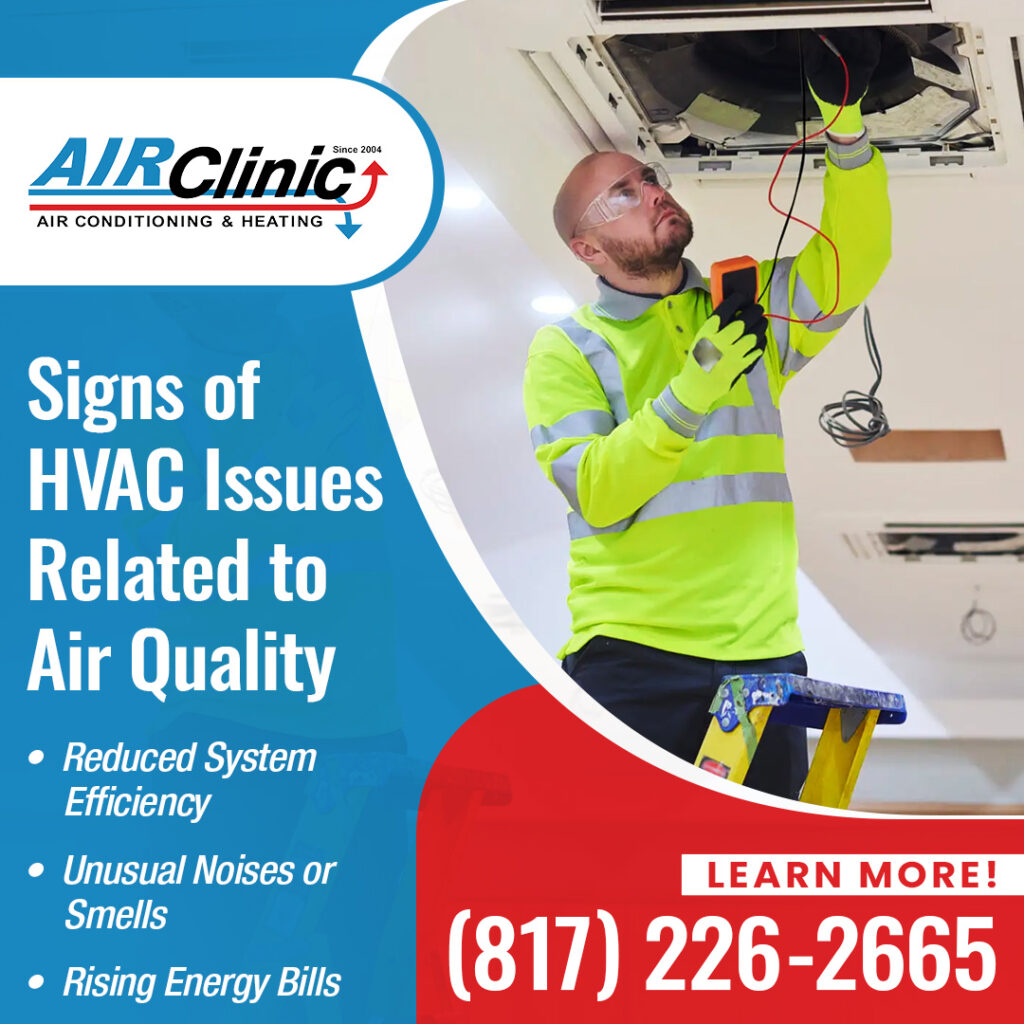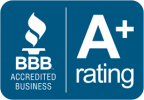Key Takeaways:
- Poor air quality in Arlington, TX, can considerably impact HVAC performance and indoor air comfort.
- Dust, allergens, and pollutants clog filters and strain the system, leading to inefficiency and potential repairs.
- Routine maintenance and proactive measures can improve system longevity and enhance indoor air quality.
Arlington, TX, residents often contend with fluctuating air quality, and the impact extends beyond personal health to home systems. Poor air quality can strain HVAC units, leading to inefficiencies, frequent breakdowns, and higher energy costs. Regular air conditioning repair and maintenance play a pivotal role in mitigating these challenges. By managing issues caused by pollutants and making sure the system operates well, homeowners can enjoy cleaner air and reliable performance throughout the year.

How Air Quality in Arlington, TX Impacts HVAC Systems
Air quality issues in Arlington, TX, don’t just affect comfort and health—they directly influence the performance and lifespan of HVAC systems. Dust, debris, and pollutants create challenges that demand attention to keep systems running efficiently.
Dust and Debris Clogging Air Filters
Arlington’s air quality often brings plenty of dust, pollen, and other particles into HVAC systems, quickly clogging air filters. These filters are created to capture pollutants and confirm clean airflow, but when they become overloaded, they obstruct the system’s ability to operate efficiently. Blocked filters increase the workload on the HVAC system, forcing it to consume more energy to push air through the obstructions. This inefficiency leads to higher energy bills and uneven temperature regulation throughout the home.
Over time, clogged filters can allow debris to bypass the barrier and settle in the system’s internal components, compounding the problem. This buildup can lead to overheating or damage to critical parts, such as the blower motor or compressor. Regular filter replacements, ideally every 1–3 months, are a simple yet necessary step to prevent this issue. Upgrading to high-efficiency filters can also help capture smaller particles, keeping both the HVAC system and indoor air cleaner.
Contaminants Affecting Internal Components
Airborne pollutants that enter HVAC systems don’t stop at the filters. Fine particles, such as dust and pollen, make their way into the internal components, settling on critical areas like coils, blowers, and ductwork. Over time, this accumulation creates layers of debris that act as insulation on heat exchange components. When the coils are coated with dust, they lose their ability to transfer heat effectively, which can result in uneven cooling or heating performance.
Contaminants in the blower can also disrupt the airflow, leading to noise, decreased efficiency, and, in some cases, motor strain or failure. Additionally, the damp environment inside HVAC systems provides an ideal breeding ground for mold and mildew, further affecting air quality and the system’s performance. Regular professional maintenance, including coil cleaning and duct inspections, is vital to treating these issues. Preventative care not only protects the internal components from damage but also makes sure that the system operates efficiently, providing consistent and reliable indoor comfort.
Strain on System Longevity
Poor air quality doesn’t just reduce HVAC performance in the short term—it accelerates wear and tear, shortening the system’s lifespan. When filters are clogged and internal components are coated with debris, the HVAC system is forced to work harder to maintain the desired temperature. This added strain increases the likelihood of overheating and mechanical failures.
As the system compensates for blockages and inefficiencies, parts like the compressor and blower motor experience excessive wear. Over time, this can lead to costly repairs or even premature system replacement. Beyond mechanical strain, contaminants circulating through the system can corrode sensitive components, additionally degrading performance.
Investing in regular maintenance and air quality improvements can reduce this strain. Clean filters, routine inspections, and preventative repairs help extend the life of the HVAC system. By treating air quality challenges proactively, Arlington homeowners can avoid unexpected breakdowns, save on energy costs, and guarantee that their system operates efficiently for years to come.
Common Signs of HVAC Issues Caused by Poor Air Quality
Poor air quality can lead to noticeable HVAC problems, such as reduced cooling or heating efficiency, unusual noises or odors, and unexplained increases in energy bills. Recognizing these signs early can prevent costly repairs.
Reduced Cooling or Heating Efficiency
When an HVAC system struggles to maintain the desired indoor temperature, it often points to issues caused by poor air quality. Dust, debris, and other airborne particles can clog filters, reducing airflow and forcing the system to work harder to cool or heat the space. Additionally, blocked ducts may impede the movement of conditioned air, leading to uneven temperature distribution in the home.
These obstructions not only decrease the system’s performance but also put extra strain on its components. Over time, this can result in more frequent repairs and an overall decline in the system’s reliability. Homeowners may notice rooms that are consistently warmer or cooler than others, even when the system is running at full capacity. Routine filter replacements and duct cleanings can alleviate these issues and restore the system’s ability to operate efficiently, ensuring consistent comfort throughout the home.
Unusual Noises or Smells
Strange noises or odors coming from an HVAC system are often signs of contamination or mechanical issues. Poor air quality introduces dust, pollen, and other pollutants that can accumulate on internal components. Over time, this buildup may cause parts to malfunction, resulting in grinding, squealing, or banging sounds. These noises typically indicate that a blower motor, fan, or other moving parts are struggling to operate under stress.
Additionally, contaminants can foster the growth of mold and mildew within the system, leading to musty odors when the HVAC is running. In some cases, burnt smells may arise from overheating components caused by restricted airflow. Ignoring these warning signs can lead to more severe problems, such as component failure or system breakdown.
It is important to treat unusual noises or odors promptly through professional inspection and cleaning to prevent further damage. Maintenance services can remove debris, clean the system, and make sure that all components are functioning properly, eliminating unpleasant smells and restoring quiet operation.
Rising Energy Bills
A sudden increase in energy bills is a common indicator of HVAC inefficiency caused by poor air quality. When filters are clogged, or internal components are covered in debris, the system requires more energy to maintain performance. The added workload on the system can drive up utility costs immensely, even if usage patterns remain unchanged.
Pollutants can also obstruct ducts and reduce airflow, causing the system to run longer cycles to achieve the desired temperature. This not only wastes energy but also accelerates wear and tear on critical components, increasing the likelihood of future repairs. Homeowners may notice their energy bills climbing month after month without any noticeable improvement in comfort.
Handling these issues involves regular maintenance, including filter changes, duct cleanings, and inspections of the HVAC system. Upgrading to high-efficiency filters and considering air quality solutions, such as purifiers or UV lights, can also improve performance and help maintain stable energy costs. Proactive care makes sure that the system runs efficiently and keeps utility expenses under control.
Proactive Solutions to Protect HVAC Systems from Poor Air Quality
Implementing proactive measures can relieve the impact of Arlington’s air quality on HVAC systems, helping to maintain efficiency and longevity while guaranteeing a healthier indoor environment.
Regular Filter Replacements
Replacing HVAC air filters regularly is one of the simplest and most effective ways to protect the system from poor air quality. Air filters are designed to trap dust, pollen, and other airborne particles, preventing them from entering the system’s internal components. However, when filters become clogged, airflow is restricted, forcing the system to work harder and reducing its overall efficiency. Changing filters every 1–3 months keeps airflow unrestricted and helps the system maintain stable performance.
For homes in Arlington, where outdoor pollutants are prevalent, high-efficiency filters can provide additional protection. These filters capture finer particles than standard filters might miss, further improving indoor air quality and reducing stress on the system. It’s important to check filter compatibility with the HVAC unit to ascertain proper installation and confirm that effectiveness is taken care of. Staying consistent with filter replacements extends the life of HVAC systems, improving energy efficiency and maintaining consistent indoor comfort.
Scheduling Professional Maintenance
Regular professional maintenance is necessary for safeguarding HVAC systems from the effects of poor air quality. During maintenance appointments, technicians perform thorough inspections and tune-ups to identify and manage potential issues before they escalate. Key tasks include cleaning internal components, such as coils and blower fans, and checking ductwork for blockages or leaks. These services guarantee that the system operates efficiently and consistently.
In areas like Arlington, where outdoor pollutants are a constant concern, maintenance can also include evaluating air quality-related problems. Technicians may recommend specific solutions, such as enhanced filtration or additional equipment, to manage ongoing challenges. Scheduling maintenance at least twice a year—once before the cooling season and once before the heating season—guarantees that the HVAC system is prepared to handle peak usage periods.
Proactive care not only reduces the likelihood of unexpected breakdowns but also preserves the system’s efficiency and longevity. By investing in routine maintenance, homeowners can save on repair costs and enjoy improved comfort and air quality year-round.
Installing Air Purifiers and Ventilation Enhancements
Supplementing HVAC systems with air purifiers and ventilation upgrades can particularly improve indoor air quality while reducing the strain on the system. Air purifiers, including UV light systems, help capture or neutralize pollutants like dust, allergens, and even mold spores before they reach the HVAC components. This prevents buildup on coils and blowers, preserving system efficiency and performance.
Enhanced ventilation systems, such as energy recovery ventilators (ERVs), introduce fresh outdoor air while expelling indoor pollutants, maintaining a balanced airflow. This is especially beneficial in areas with poor air quality, as it prevents the accumulation of contaminants inside the home. Upgrading ductwork or adding humidity control solutions can further enhance the system’s ability to maintain a clean and comfortable environment.
The Role of Seasonal Changes in Arlington, TX
Seasonal changes in Arlington, TX, affect HVAC systems, with spring allergens and summer humidity posing unique challenges. Managing these issues guarantees better performance and indoor comfort.
Spring Allergens and HVAC Performance
Spring pollen levels in Arlington can quickly clog HVAC filters, forcing the system to work harder and reducing its efficiency. Neglected filters allow allergens to circulate indoors, impacting air quality and health.
Replacing filters more often in spring and using high-efficiency options helps keep airflow smooth and allergens at bay. Duct cleaning and sealing also prevent pollen buildup, securing efficient system performance and a healthier home.
Humidity and Summer Strains
Arlington’s humid summers increase the risk of mold growth in HVAC ducts, compromising air quality and system health. Excess moisture can also strain the system, leading to inefficiency and damage.
Maintaining indoor humidity between 30% and 50% with a dehumidifier protects the system and prevents moisture issues. Summer maintenance, including cleaning coils and inspecting ducts, keeps the HVAC running smoothly and efficiently.
Benefits of Regular AC Repair Services in Arlington, TX
- Enhanced System Efficiency: Timely air conditioning repair services prevent minor issues from escalating, making sure the system operates efficiently and consumes less energy.
- Improved Indoor Comfort: Professional maintenance helps maintain consistent cooling and air quality, even during Arlington’s hottest months.
- Prolonged System Lifespan: Regular air conditioning repair services reduce wear and tear, extending the unit’s lifespan and avoiding premature replacements.
- Lower Utility Costs: Promptly identifying inefficiencies reduces energy waste, leading to noticeable savings on energy bills.
- Prevention of Major Breakdowns: Routine inspections and repairs help detect potential issues early, reducing the likelihood of costly emergency repairs.
- Better Air Quality: Air conditioning repair services in Arlington, TX, guarantee clean filters and components, promoting healthier indoor air free from dust and pollutants.
Reasons to Choose Air Clinic for HVAC Maintenance and Repairs
Local Expertise in Arlington’s Air Quality Challenges
Air Clinic has a deep understanding of the unique environmental challenges affecting HVAC systems in Arlington, TX. The region’s fluctuating air quality, including high pollen counts and seasonal humidity, can take a toll on air conditioning systems. As a trusted provider of air conditioning repair services in Arlington, TX, Air Clinic tailors solutions to meet the specific needs of residents. From managing filter clogs caused by allergens to preventing mold from excess humidity, our team is equipped with the expertise to keep systems running smoothly, providing efficient performance and better indoor air quality year-round.
Thorough Repair and Maintenance Services
Air Clinic provides thorough services that are devised to handle all aspects of HVAC care. Our skilled technicians specialize in AC repair service, providing efficient and reliable operation for Arlington residents. Services include routine filter replacements to combat dust and debris buildup, thorough duct cleaning to improve airflow, and advanced air quality solutions such as air purifiers. These tailored approaches maintain optimum system performance, reduce energy consumption, and promote a healthier indoor environment. Air Clinic’s commitment to quality guarantees that every air conditioning repair meets the highest standards, keeping Arlington homes cool and comfortable.
Commitment to Customer Satisfaction
Air Clinic places a strong emphasis on delivering exceptional customer service to Arlington, TX residents. Every AC repair service in Arlington, TX, is approached with professionalism and attention to detail. Whether managing routine maintenance or resolving complex issues, our team is dedicated to exceeding customer expectations. Reliable air conditioning repair secures consistent cooling, reduced energy costs, and healthier indoor air for local homes. By focusing on the comfort and well-being of every client, Air Clinic has earned a reputation as a trusted provider of AC repairs in Arlington, TX, offering dependable solutions for all HVAC needs.
Trust Expert Air Conditioning Repair by Air Clinic
Poor air quality in Arlington, TX, impacts health and compromises HVAC efficiency and longevity. Taking proactive steps, such as regular maintenance, filter replacements, and investing in air purification systems, makes sure that your HVAC system remains resilient. Trust Air Clinic for expert air conditioning repair and maintenance services that prioritize system efficiency and indoor air comfort. Contact us today at (817) 226-2665 to learn more.










